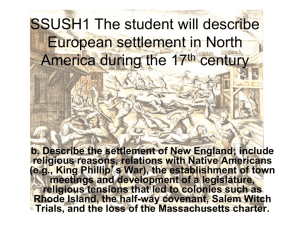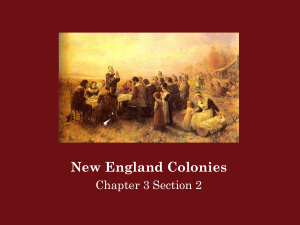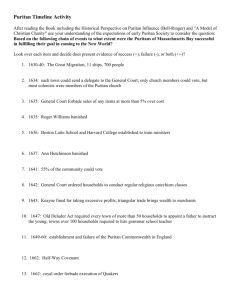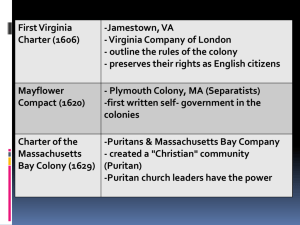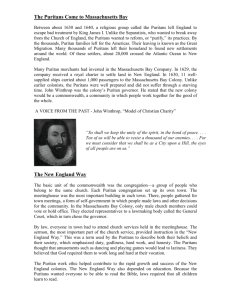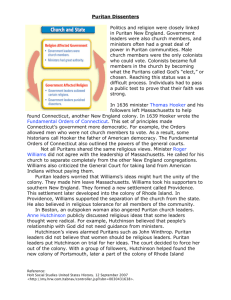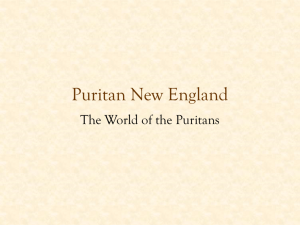SSUSH1 The student will describe European settlement in North
advertisement
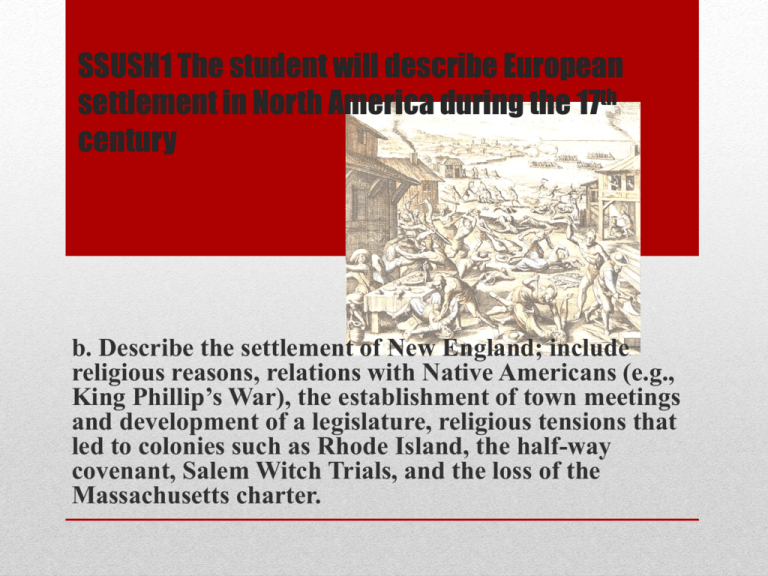
SSUSH1 The student will describe European settlement in North America during the 17th century b. Describe the settlement of New England; include religious reasons, relations with Native Americans (e.g., King Phillip’s War), the establishment of town meetings and development of a legislature, religious tensions that led to colonies such as Rhode Island, the half-way covenant, Salem Witch Trials, and the loss of the Massachusetts charter. New England settlement • The Pilgrims, which were a separatist group that broke away from the Church of England, established the Plymouth Colony in 1620. • The Massachusetts Bay Colony was established by John Winthrop in 1630 as a refuge for Puritans who were being persecuted in England. Massachusetts Bay Colony • Laws were passed requiring everyone to attend the Puritan church. • The government collected taxes used to support the established Puritan church. • The Puritan Church was intolerant of other religions. • Settlers could be charged with heresy and banished from the colony if they spoke out against the church. • In 1635 a preacher named Roger Williams was banished from the Massachusetts Bay Colony for speaking out against the Puritan way. • Williams founded Providence: he separated the church and state and allowed differing religious beliefs. Rhode Island Created in 1662, it provided a partial church membership for the children and grandchildren of Puritan church members as a means of keeping the church's influence in society. Half-Way Covenant King Phillip’s War • By the 1670s colonial governments began demanding that natives follow English laws and customs. • King Phillip (a Native leader), led an uprising against the colonists . • King Phillip was killed in 1676 and the war ended in 1678 ending any further Native resistance in New England. Salem Witch Trials • . • 20 residents of Salem executed for being witches. • Accused by a group of teenage girls. • The group admitted later that they had made up the accusations. • Reasons for the accusations may have been from cultural/economic differences. New England Government • Town Meetings: town residents met to discuss local issues and to pass laws for the local community. • Town meetings gave the locals a chance at self government (Why would this lead to the American Revolution?). Massachusetts loses it’s Charter • The Glorious Revolution The new charter held that: in England led to the • The people could elect an removal of King James II. assembly, however King William held the power to • William and Mary issue a appoint the Governor. new, Royal Charter in 1691. • Voters had to own property, but no longer had to be members of the Puritan Church. (How did this spell the end of Puritan Power in New England?) Questions 1. Why did the Puritans colonize Massachusetts and how did their religion influence their government? 2. Why was Rhode Island founded? 3. How was the half-way covenant a response to the founding of R.I.? 4. What were the causes and results of King Phillip’s War? 5. What type of local government did the Massachusetts colonists develop? 6. How did Massachusetts lose it’s charter?
